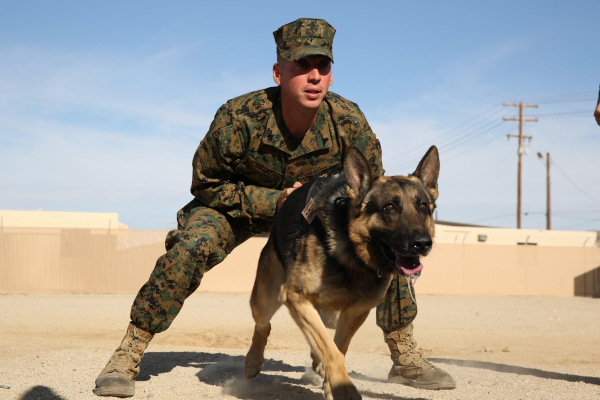You swell with pride at the sight of your partner, best friend, and loyal companion as they alert to an improvised explosive device buried just in front of your squad as they make their way down a hot, desert road.
The training has finally paid off, and you get to share in the jubilation of knowing that you and your partner were on point for a reason, to find explosives and save the lives of countless members in your squad.
This is the life of a Marine Corps military working dog handler (MWD), also known as MOS 5812.
It is an MOS that is reserved for Marines who have shown exemplary leadership, duty above and beyond normal Marine duties, and have gone through a rigorous selection process to be selected to work with a military K9.
MOS 5812 is, exclusively, a secondary MOS for any Marine that was originally a 5811, military police.
Related Article – Marine Corps Military Police (MOS 5811): Career Details
Jump To A Section
Requirements and Qualifications
- Must be a U.S. Marine who is currently serving as a 5811, military police
- Apply for the 5812 MOS and be willing to submit to a very competitive selection process where only the most exemplary Marines will be chosen to become K9 handlers
- Attend and pass the Military Working Dog Basic Handler Course at Joint Base San Antonio-Lackland, TX.
- Complete the Specialized Search Dog Handler Course or Combat Tracker Dog Handler Course
- Have no fear of dogs
- Be healthy, have a spleen, and be able to fend off any common zoonotic infections that stem from dogs
Related Article: Marine Corps Height And Weight Standards
Training and Career Path
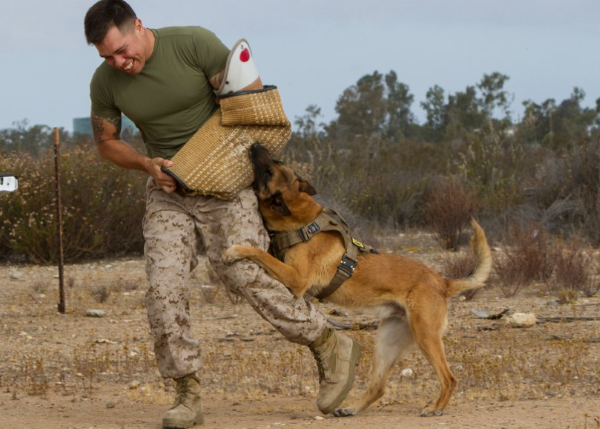
The military working dog handler MOS is exclusively for Marines who have completed and are serving as military policemen or policewomen.
Anyone in this MOS is eligible to apply for the secondary MOS 5812.
However, if this is a goal, then it is advised that Marines start showing exemplary leadership, fitness, and discipline from the first day they join the Marines.
Becoming a military dog handler is highly sought after by a large portion of Marines who join the military police.
Therefore, the level of competition is extremely high since there are a limited number of dogs available on a regular basis.
How are Marines selected to become dog handlers?
Marine leadership will review the application and will pour through the military record of the applicant to look for obvious signs of excellence.
This will include PFT scores, volunteer work, letters of recommendation, and anything else that shows that the Marine applicant has been going above and beyond the normal expectations of duty.
Marines that have been doing average tasks, without seeking other opportunities beyond normal duty hours, will struggle to be set apart from their peers and will therefore struggle with being selected for MOS 5812.
Once chosen, Marines can expect to go to Joint Base San Antonio-Lackland to attend the Military Working Dog Basic Handler Course.
Here, Marines will be paired with a dog that matches their personality and will begin working daily to develop a strong rapport with that dog.
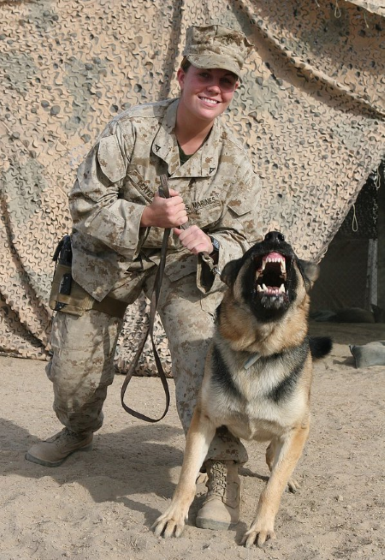
Candidates may be recycled to a different class or sent back to their unit altogether if they fail to build a rapport with any K9.
Generally, Marines will have up to 30 days to show a significant bonding and ability to work side by side with their new partner.
Related Article – Marine Corps MOS List and ASVAB Scores: Details Of All 123 Jobs
The Marine Dog Handler Course is not easy, and it requires several hours of working with dogs, daily, as well as some classroom time to cover ways to best utilize a working dog, basic K9 first aid, and care and maintenance of a military working dog.
Students will graduate and be ready to return to their unit with their new partner or wherever the Marine Corps may need them to go.
How Much Are Marine Dog Handlers Paid?
All reports show that military working dog handlers do not receive any special monthly pay incentives.
Therefore, marines working with military dogs will receive the same base pay as everyone enlisted in the military across all branches.
Marines working with K9s are eligible for hazard bonus pay when deployed or involved with special cases that cause them to be placed in harmful situations.
This will be unit specific and a list of requirements will have to be met prior to being eligible for hazard pay.
The basic pay amounts for all enlisted members up to the rank of E5 are included below.
Related Article: Marine Corps Ranks And Pay
This pay is take-home pay before taxes and does not consider the added benefits of the military like free room and board, 2 guaranteed meals per day, and dental, medical, and vision insurance.
Here’s a pay chart detailing the ranks and pay in the Marine Corps:
| Insignia | Pay Grade | Rank | Abbreviation | 2023 Minimum Monthly Pay |
|---|---|---|---|---|
| E-1 +4 months | Private | Pvt | $1,917.60 | |
| E-2 | Private First Class | PFC | $2,149.20 | |
| E-3 | Lance Corporal | LCpl | $2,259.90 | |
| E-4 | Corporal | Cpl | $2,503.50 | |
| E-5 | Sergeant | Sgt | $2,730.30 | |
| E-6 | Staff Sergeant | SSgt | $2,980.50 | |
| E-7 | Gunnery Sergeant | GySgt | $3,3445.80 | |
| E-8 | Master Sergeant | MSgt | $4,957.20 | |
| E-8 | First Sergeant | 1stSgt | $4,957.20 | |
| E-9 | Master Gunnery Sergeant | MGySgt | $6,055.50 | |
| E-9 | Sergeant Major | SgtMaj | $6,055.50 | |
| E-9 | Sergeant Major Of The Marine Corps | SgtMaj | $6,055.50 |
Day in the Life of a Marine Military Working Dog Handler
While at their home base, in garrison, marine MWD handlers will serve in a near identical capacity as law enforcement officers in the civilian world.
They will be placed on a shift schedule and patrol as normal police officers until the need arises for them to utilize the working dog.
Additionally, military working dog handlers may find themselves on gate patrols where they will monitor vehicle traffic and search for drugs or explosives that someone is attempting to bring onto the base.
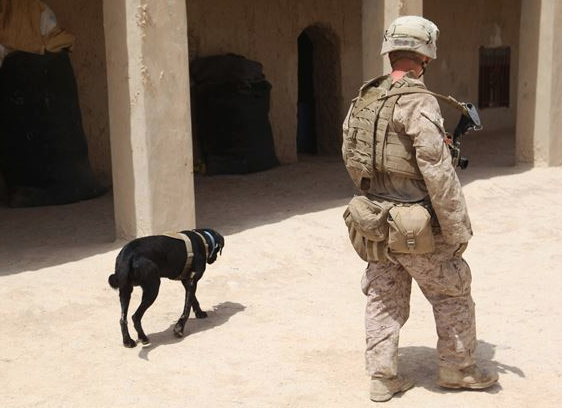
Keeping Marines, their families, and other military members safe is the primary objective of military working dogs and handlers.
Therefore, it is not uncommon for military dogs to be used for vehicle and property searches where suspected contraband may be hidden.
Military working dog handlers enjoy a unique lifestyle. They are an elite group that is very small, highly trained, and highly utilized.
It is not uncommon for dog handlers to be called away for special duty assignments, like VIP route clearance, presidential details, or even special assignments abroad for short periods of time, also known as TDA or temporary duty assignments.
Two recent reviews from U.S. Army dog handlers display a level of gratification with their career while also a bit of frustration with the long hours and high stress associated with being a dog handler.
One reviewer even mentioned the fact that you will not be allowed to take your dog with you to a new duty station so a new bond will have to be developed whenever a dog handler must relocate to new duty stations.
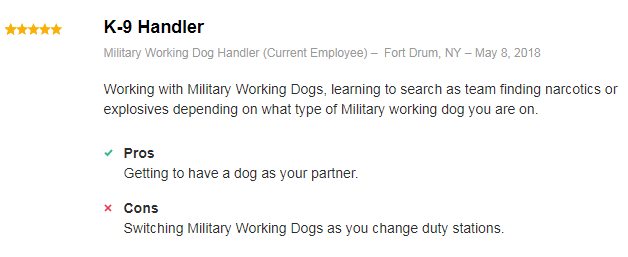
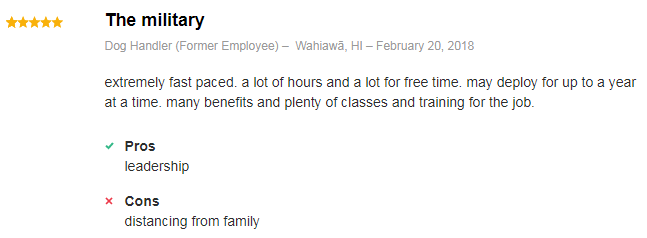
While deployed, military working dog handlers will be extremely busy.
They will be asked to do patrols with military police units or infantry units.
Generally, K9 handlers will be at the front of patrols and be extremely vulnerable to attacks from enemy forces while they focus on working their dog and directing them toward the right path.
Patrols can be long, hot, and exhausting, so it is imperative that dog handlers know how to take care of themselves and their K9 partner.
Additionally, dog handlers may be tasked with standing duty at checkpoints or gates where they will sniff vehicles for explosives or weapons as they pass through the checkpoints.
It is a very active job and can be dangerous given the level of exposure to the enemy.
Enemy forces have learned the capabilities of military working dogs, so they are not opposed to targeting them and their handlers to prevent detection.
Civilian Career Opportunities
Military working dog handlers can enjoy a comfortable career working for civilian agencies that need experienced dog handlers.
There are several companies that train K9s to perform similar tasks as police dogs.
They will then use these dogs to assist police or to work private security events.
These companies are always looking for dog handlers who are immediately ready to start working with dogs without needing on-the-job training.
For marines who are interested in continuing work as a police officer, federal agent, or state police officer working dog handler, they will usually be required to start at the bottom and work their way up to be a dog handler for that agency.
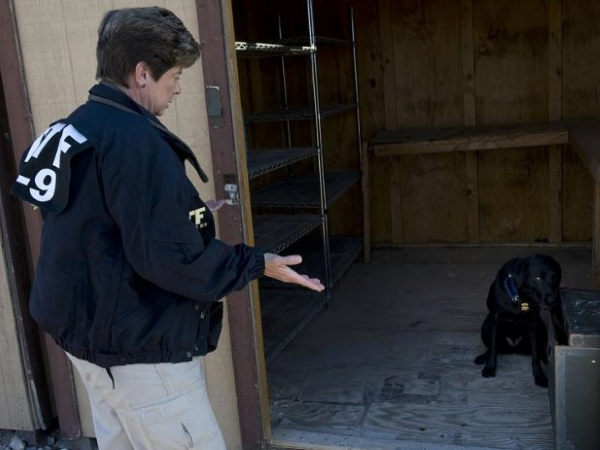
This is not always the case, and some agencies may allow individuals to start right away as a K9 handler because of their experience.
There are several companies around the world that train military working dogs and prepare them to go work for police and military agencies.
Most of these companies are founded and run by former military or police dog handlers.
Some of these companies can be very lucrative and provide a comfortable lifestyle for the owners and founders.
Individuals interested in working with dogs, but not with police or military-style trained dogs, may find opportunities as business owners who specialize in therapy dogs, search and rescue dogs, or just basic obedience schools for people with problem dogs who need help with training.
There are countless opportunities waiting for military working dog handlers in the civilian world.
Whether they want to continue serving their communities as police officers or federal agents or have the desire to start their own companies, military working dog handlers have the knowledge and skillset needed to succeed and enjoy a comfortable lifestyle working alongside dogs or training people to be successful handlers.
References / Resources
- 5 Best Jobs for Female Marines - June 20, 2024
- 10 Best Marine Corps Recruiting Videos of All Time - June 20, 2024
- Marine Corps Requirements - June 20, 2024
Originally posted on July 18, 2019 @ 2:29 am
Affiliate Disclosure: This post may contain affiliate links. If you click and purchase, I may receive a small commission at no extra cost to you. I only recommend products I have personally vetted. Learn more.
